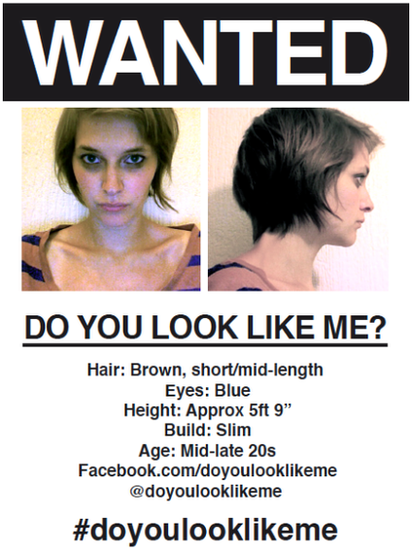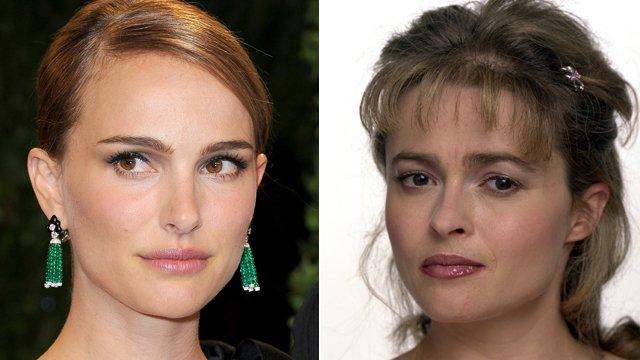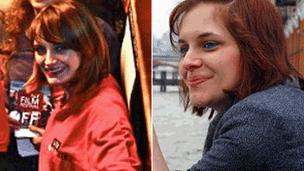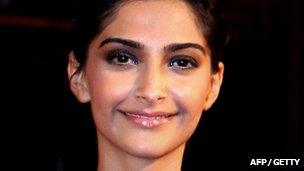Doppelganger: Desperately seeking my lookalike
- Published
Sophie Robehmed visits a software company on her doppelganger quest
Sophie Robehmed has been searching for her double for several months. Here she gives a personal account of her ongoing quest.
I started looking for my doppelganger on 17 November 2011. What started as an idea for a feature - a social experiment to see if I can find my double using the internet, word of mouth and basically any way possible - has since turned me into a woman on a mission.
It's not only the needle in a haystack search that interests me but also the possibility that we all have a double walking around somewhere, that pushes me on to find her and discover where our similarities end.

The first thing I did was start a blog, external, outlining my objective, why I was doing it and some ground rules. I wanted "real-life" suggestions as opposed to famous people. Of course I'm working on an assumption that I even have a doppelganger. So how likely is it that I do have a lookalike and that I'll find her if so?
"It depends on who is doing the looking," says Rob Jenkins, cognitive psychologist at the University of Glasgow. "We are surprisingly bad at telling people apart when we don't know them but there will be someone in the world who is similar enough to fool the untrained eye.
"It's not an impossible task, but by judging the similarity yourself, you are setting the bar extremely high, precisely because your own face is so familiar to you."
"But my guess is that if you could check every face in the world, you would find someone similar enough to fool even you, at least some of the time. The problem is the practical difficulty of inspecting enough faces."
Since there's umpteen faces that follow celebrities on Twitter, I targeted, external these high-profile tweeters, asking for a retweet with #doyoulooklikeme as a hashtag, to help speed up my search.
Comedian Dom Joly and writers India Knight, Jill Mansell and Caitlin Moran, who was particularly interested in my project, obliged sending my blog stats crazy and inbox full of new follower notifications.

Two popular Twitter suggestions: Natalie Portman and Helena Bonham-Carter (in 2005)
I started getting lookalike suggestions, but still mostly celebrities with Natalie Portman and Helena Bonham-Carter being particularly popular choices.
I was sharing #doyoulooklikeme on my Facebook timeline too, which led to the first genuinely promising suggestion: a fellow creative called Lauren, who is working in the film industry and based in Birmingham.
Lebanese link?
I put her on the blog, external with a poll so people could rate our likeness (8/10 proved most popular). She's a bit younger than me but is still definitely one of my best doppelganger suggestions yet.
In the beginning, there was a real momentum to my project. I had strangers interested in how this was going to develop and I talked to a couple of radio stations about my search.

First lead: Lauren (left) in 2011 and Sophie in 2009
But there was only so many times I could tweet or Facebook about my quest without feeling self-conscious that my project would seem like a narcissistic attempt at self-promotion. So I started concentrating on researching leads in the real world like contacting London's Lebanese Society. Being British-Lebanese, I figured my lookalike could be too.
The Lebanese Society were not forthcoming. But according to an expert in Human Evolutionary Genetics who advised me, this may have been a false lead anyway.
"Between Europe and the Middle East historically there have been a number of population dispersals over time, in both directions," warned Dr Toomas Kivisild, lecturer in human evolutionary genetics, at Cambridge University's department of biological anthropology ."Being British-Lebanese does not actually make you that unique."
Going global
While being British-Lebanese may sound exotic and be an important part of my identity, in terms of my genetic make-up, it is not so significant.
The search for a doppelganger must be truly global, according to Dr Kivisild. "Wherever there is a geographical continuum that humans can occupy, they normally do."

Facebook yielded the suggestion of Bollywood actress Sonam Kapoor
This naturally leads to a mixture of the DNA between the populations, which will play a role determining facial characteristics. Even parts of the far East Asia can be shown to have a "European mix" in the make-up of their modern DNA, Dr Kivisild said.
If the search must indeed be global, then at least in the world wide web I had the perfect tool for the task. So to this I returned.
I made a Facebook page, external and a YouTube video, external (which I'm tempted to delete since I seem drunk, amused by my sister behind the camera who also seems to be under the influence because she was holding up my laptop and couldn't see what she was filming). No wonder it hasn't gone viral.
Through my Facebook page I published a Wanted poster a friend designed for me. This yielded an intriguing suggestion, external: a Bollywood actress called Sonam Kapoor.
A man in India sent me a black and white picture of her and although we share a likeness, our skin tone, eye and hair colour are of course nothing like one another's. Several people who commented on my timeline wrote this was the best likeness yet.
Facial analysis
Having come across many apps online with basic facial recognition software capabilities, I was keen to gain access to a more sophisticated version. So I decided to pay a visit to the Aurora company in Northamptonshire.
The company designs facial recognition hardware and software, kitting out the likes of Heathrow Airport and police forces nationwide. I brought with me some recent photographs of myself for them to analyse.
Their software was able to examine my face and find matches, which ranged from Natalie Portman to Nancy Reagan!
The hitch was that the database we used was only global in terms of the celebrities it contained - again, I wanted my search to encompass "normal" people, and they were not included.
"In order to find your doppelganger, we have to scale up the search," Dr Tom Heseltine, a biometrics consultant at Aurora, told me.
"One could imagine a system that scours the social media sphere of the web - Facebook, Twitter, Instagram, Twitpic, Yfrog, Photobucket, Flickr, Picasa - detecting every face present on public profiles and comparing it with your own photographs.
"Such an operation would take many weeks of intensive processing power to complete, but if your doppelganger is out there on the web, such an operation would no doubt find such a match."
So the challenge continues, and maybe this article will throw up some fresh leads. Here's hoping.